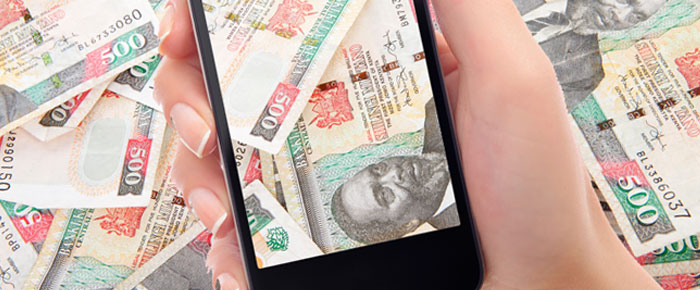
Mobile money transfer (MMT) services have in recent years arguably been the single most effective contributor to global financial inclusion initiatives, and particularly in developing countries, have facilitated access to cheap and reliable financial services to an ever increasing unbanked population segment.
Recent innovations in mobile transfer services in countries, such as Kenya, have heralded unprecedented success in financial inclusion initiatives. In Kenya the M-Pesa service, which was pioneered by Safaricom Limited jointly with Vodafone UK in 2007, has received widespread international acclaim as the top ranking money transfer service globally. In recent years, innovations by Safaricom Limited have helped M-Pesa in Kenya grow from a simple money transfer service to a major payment service with millions of transactions worth billions of dollars annually. The services available under M-Pesa include retail purchases, Airtime Top Ups (Minutes), ATM withdrawals, international money transfers, medical and other charitable fundraising payments, bulk payment services through partnership with banks, insurance companies, micro finance, savings and credit societies, schools and other corporate organizations. These services facilitate the payment of regular and utility bills, banking transactions—including the transfer and withdrawal of funds from bank accounts, payroll and salary disbursements, loan disbursements and repayments, payments for goods, and school fees payments.
However, with the prevalence of mobile phones and the wide acceptance of MMTs as an alternative tool for financial inclusion in developing countries, MMTs and other financial institutions offering mobile banking services are fast becoming a soft target for mobile banking fraudsters, with those institutions lacking fully automated fraud prevention and transaction monitoring systems and controls being the most affected.
In this regard, the mobile money transfer service has rapidly become one of the preferred conduits for the perpetration of fraud, largely due to the ease of delivery and the fact that it is a cashless service without face-to face transactions , hence frontline, know your customer checks may not be possible on an on-going basis.
The escalation of mobile fraud has given rise to an increasing need to implement comprehensive AML programs in the mobile transfer and electronic payments sectors that are in line with the FATF recommendations. There also is a need to promote the sharing of information on AML best practises including suspicious transactions reporting, for the prevention of money laundering related fraud and financing of terrorism.
This need was underscored by the FATF Guidance Paper of June 2011 on Anti-Money Laundering and Terrorist Financing Measures and Financial Inclusion whose primary objective was aimed at interalia, supporting efforts among competent authorities, across sectors and across jurisdictions that promote the complementarity of AML/CFT and financial inclusion. The guidance paper also supports the development of a common understanding of the FATF standards that are relevant when promoting financial inclusion and explicitly an understanding of the flexibility they offer with particular reference to the FATF risk-based approach. 1
The guidance paper specifically makes mention of mobile money as being among the "new financial products and services…created in the past few years which may contribute to expanding access to new markets and clients" 2 and advocates for appropriate controls in line with the overall objective of the paper.
Mobile Money Vulnerabilities to Money Laundering and Terrorism Financing
Mobile money has various risks which make it vulnerable to money laundering and terrorist financing.3
- Delivery/Systemic Risk: Its speed, portability and security make MMT a preferred service in developing countries and has led to the emergence of various mobile money frauds and scams
- Geographic Risk: Countries with deficiencies in AML controls, corruption, sanctions, and terrorist backgrounds will be more vulnerable to having their financial systems used for money laundering and terrorist financing activities,
- Product Risk: There is the risk of unregistered users, minimal or no transaction limits, unregulated international money transfers and partnerships with third parties with inadequate or no AML programs
- Customer Risk: Countries with largely unbanked and/or illiterate rural populations and no identification regimes, or where there is an absence of easily identifiable residential and utility account information, will experience difficulties in the implementation of effective KYC and customer due diligence and, in particular, ensuring the quality of KYC information collected due to the lack of proper documentation and identification processes, and inability to store and retrieve customer information
- Agent Risk: MMTs with a large agent network, particularly in the rural areas, suffer challenges in implementing effective AML programs due to poorly trained agents leading to KYC compliance violations, inability to monitor high volume/high value transactions, lack of infrastructure and difficulties in carrying out regular due diligence and compliance monitoring on a large network
- Training: Difficulties in engendering a culture of AML awareness and suspicious activity reporting among the staff, agents and customers of MMT institutions
- Resources: The scale of mobile money in terms of customers, agents and transactions makes AML operations extremely resource intensive and many MMTs may not be in a position to afford the investment involved.
Common Money Laundering Typologies in Mobile Money
The following are common typologies specific to mobile money transfers 4
- Unregistered international money transfer services offered by informal money transfer agents
- Suspicious agent activity outside the norm, which includes frequent deposits, multiple registrations, remote withdrawals, direct deposits etc.
- Customers/agents registering multiple lines and/or carrying out multiple high value/high volume transactions to circumvent transaction thresholds
- Hoaxes and scams/schemes to defraud unsuspecting customers
- Bribery and corruption payments
- Facilitation of payments for illegal activities/ predicate offences–cashless facility, multiple transfers/deposits
- Kidnapping and extortion with ransom payments demanded through the money transmitter.
Financial Integrity in Mobile Money: Implementation of an Effective AML Program
An effective AML program in line with FATF standards will entail putting in place the following measures:5
- Comprehensive AML policy and procedures encompassing training programs, continuous agent and staff awareness campaigns on KYC compliance and suspicious activity reporting
- Customer acceptance and identity verification at registration and thereafter for every transaction (KYC) for both individual and corporate customers
- Adoption of risk-based tiered KYC, for example no residential details or identification copy requirement on accounts with low level transactions
- Implementation of technology to capture KYC copies on higher risk accounts such as scanners or camera phones
- Customer profiling to categorize them depending on risk and business needs, for expanded migration to bill payment accounts for customers with high volume transactions to facilitate enhanced CDD
- Establishment of reasonable transaction limits depending on average business levels with systemic controls to prevent excesses
- Mandatory registration of all subscribers and restrictions on unregistered users
- Higher controls on IMT transactions and business usage
- Continuous AML awareness programs for agents, staff and customers including sensitization on various frauds and safeguard measures
- Automated suspicious transaction monitoring and watch list screening
- Suspicious activity reporting for customers, staff and agents
- Proactive risk assessments to protect M-Pesa and related services from being used for money laundering and terrorism financing
- Risk-based agent compliance monitoring programs focused on agents with high registrations or those in high-risk locations
- Agent penalty programs for non-compliance including warnings, fines, suspension of operation and claw back of commissions
- Appropriate deterrent action against fraudsters, including blocking/suspension of accounts with poor or duplicated KYC or accounts/lines that appear linked or have been used for fraud
- Profiling, arrest and prosecution of suspects involved in mobile fraud
- Recordkeeping and an audit trail for all transactions preferably using archiving systems which can electronically store customer KYC, agent due diligence and staff AML training records
- Regular engagement and proactive representations with regulatory agencies and business partners to benchmark on emergent trends and best AML practices and AML related fraud prevention measures.
Way Forward
Mobile money is in a constant state of innovation and with the entry by non-MNOs, handset manufacturers/ nontelcos/banks/ and independent companies —into the arena and the provision of independent solutions such as mobile phone based MMT applications, there will be a need for increased regulation and greater cooperation between players. In this regard, the benefits of technical inter-operability between service providers will be worth exploring.
The contribution of MMTs toward the provision of access to financial services for the unbanked majority in developing countries, therefore, cannot be gainsaid. However, such innovation must go hand in hand with appropriate controls, and there is a clear need to balance controls with business expediency and the need for financial inclusion. Product risk assessment must be incorporated in every AML program in order to ensure all risks are identified and adequately mitigated with appropriate controls.
- FATF Guidance PAPER of June 2011 on Anti-Money Laundering and Terrorist Financing Measures and Financial Inclusion pg 9 objectives
- Ditto pg 16
- Also see World Bank study on "Protecting Mobile Money against Financial Crimes, Global Policy Challenges and Solutions" http://issuu.com/world.bank.publications/docs/9780821386699/1?zoomed=&zo
- ICA International Certificated Anti-money Laundering Awareness Training (UK) – Mobile Financial Services Module
- Safaricom AML Policy and Procedures Rev 2012










